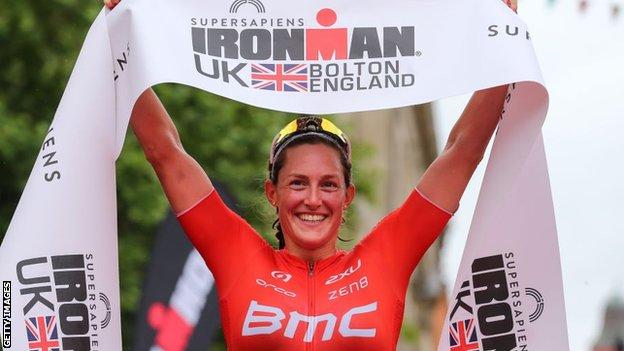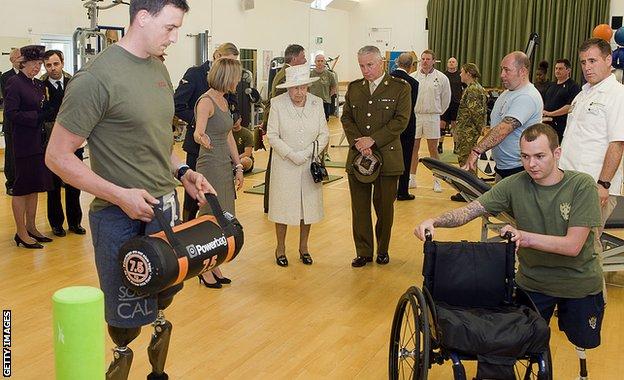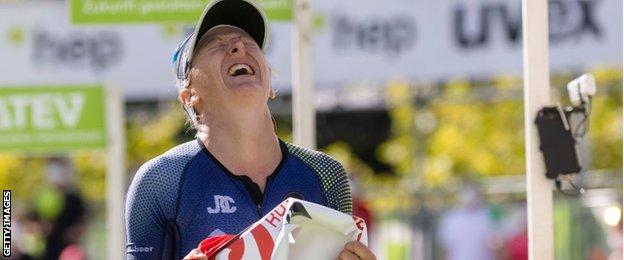
Kat Matthews is, in her words, “a data nerd.”
That’s lucky because long-distance triathlon events throw up a storm of numbers.
Stroke rate, power output, running cadence, VO2 max, beats per minute. Each point plotted in a training plan. Every marginal gain explored during massive periods of resistance.
There is not much demand for “vibes”.
That’s because the Ironman distance — a 2.4-mile swim, a 112-mile bike leg and a full marathon — leaves them no room. It demands precise preparation and delivers merciless pain. A “mood” or “energy” alone will barely get you off the starting line.
However, the atmosphere is coming into play for this Saturday’s Ironman World Championships, an event in which Britain’s Matthews, who has experience as an Army physiotherapist, will make her debut.
For the first time since the inaugural event in 1978, the World Championships are not in Hawaii, the birthplace and spiritual home of distance.
Covid has forced a change. So instead of the South Pacific, the world’s best will compete in Utah, swimming in a warm-water reservoir before biking and racing across parched asphalt in the shadow of the state’s sandstone stacks.
“It’s a slightly different environment than Hawaii,” Matthews told BBC Sport.
“The course is more dispersed, it is not so concentrated in the town.
“I think there’s been a notion in some media that if it’s not Hawaii, it’s not appropriate.
“But everyone I’ve talked to thinks it’s fantastic.
“The course itself is very different, there are so many different sections on the bike course. It won’t be a direct time trial style, it will be intense and technical.”
“So the race is three miles uphill, three miles downhill, all the way.
“Sometimes in Hawaii, if you’re a great swimmer or a great runner, you can win the race, where I think this course will reward great triathletes.”
Matthews, who started triathlon in 2015 and turned pro in 2019, is a relative newcomer to Ironman but has already made an impact.
She beat defending Ironman world champion Anne Haug by over four minutes in a middle-distance event (Ironman 70.3 as they’re known) earlier this year.
In September, she was fourth in the Ironman 70.3 World Championship event at the same Utah course that will host Saturday’s race.
With German world number one Laura Philipp and her British rival Lucy Charles-Barclay absent, Matthews is a top contender.
“Honestly, I feel in great shape,” Matthews said.
“Nobody has the perfect preparation for a world championship. There is always a training load management that has to continue.
“But I am confident that I must be in good shape after beating the world champion, someone who has also been building this world championship.”
“I’m really excited to see what I’m capable of.”
Finding the outer limits of people’s capabilities and then stretching them a little further is Matthews’ specialty.
Despite being a professional triathlete, she is still serving in the military and is supported by it.
The 31-year-old’s previous role was as a physical therapist. He worked at Headley Court, a grand stately home set in manicured gardens in Surrey, where wounded British men and women returned from the front lines with life-changing injuries.

Matthews’ task was to change their lives for the better, to give them back their movement and independence.
The sports field is less serious, but she can apply the same principles to herself.
“On the physical therapy side, you have pain, health and psychology and I use all of them on a daily basis, in collaboration with my coach, understanding myself and my own pain management,” Matthews said.
“There is a limit that only I know and I have to adapt on the day to which one it is.
“Physio is essentially about rehabilitating people. I start from a more ideal situation and try to go to the next level, beyond the functional.”
Finding a balance, between pain and gain, will be difficult in the coming weeks.
On June 5, less than a month after this weekend’s World Championships, Matthews will take on the U7/U8 Project.
The idea is similar to Eliud Kipchoge’s successful attempt to run a marathon under two hours in 2019, and the organizers hope that tweaking small details in the design of their triathlon course can lead the elite to break big barriers in terms of time.
For example, there’s a point-to-point straight swim leg in a man-made lake, a bike leg around a high-speed oval race track with banked turns, and a race with a team of pacers.
Matthews and Switzerland’s Nicola Spirig hope that the course, coupled with ideal race conditions, can take them across the Ironman distance in less than eight hours.
The current women’s record for an Ironman is eight hours and 18 minutes and 13 seconds, set by Britain’s Chrissie Wellington in 2011.
Britain’s two-time Olympic gold medalist Alistair Brownlee will be one of two male triathletes attempting to break seven hours on the same day.
The technology behind the offering is formidable, with aerodynamics tailored to each athlete.
But for Matthews, there’s something else to the challenge and triathlon in general. Something that sounds suspiciously like vibrations.
“It’s probably not that sexy,” she explained, “but the network and support from other athletes, as someone who’s only been pro for a couple of years, is really important.
“There are definitely some people who don’t want to play those games, who don’t want to get involved in the camaraderie, which is fine, but from my perspective it’s amazing, with the men helping the women, the women helping the men, the professionals and the fans are on an equal footing”.


Matthews is one of seven Britons in the 29-member professional women’s field and not the only one with a military background.
Laura Siddall, 41, served a year as an officer in the Army, trained at Sandhurst and worked as part of the Royal Electrical and Mechanical Engineers.
“There is a huge focus in the military on sports and physical activity, building teamwork and leadership through them, but also that discipline,” he said.
“If we also went a little deeper, I think the problem-solving element is attractive. In a long-distance race like ours, you’re really solving problems on the fly, making decisions about tactics as situations unfold.” .
“It’s not a war situation, it’s not that extreme or that dire, but it’s still running things on the fly and maybe the logical thinking that we’ve been trained in in the military holds.”
Siddall is one of 14 athletes in the Utah field who have yet to qualify for the second World Championships of the year, to be held in Hawaii in October.
Eight competitors can qualify for Kona with their performance this weekend.
“Once I’m on the run, I’ll try to find out who is where, but I don’t think that will change my tactics at the beginning of the day,” he said.
“I will try to control my race and be patient. It’s a cliché, but I will try to concentrate on my own race.”


